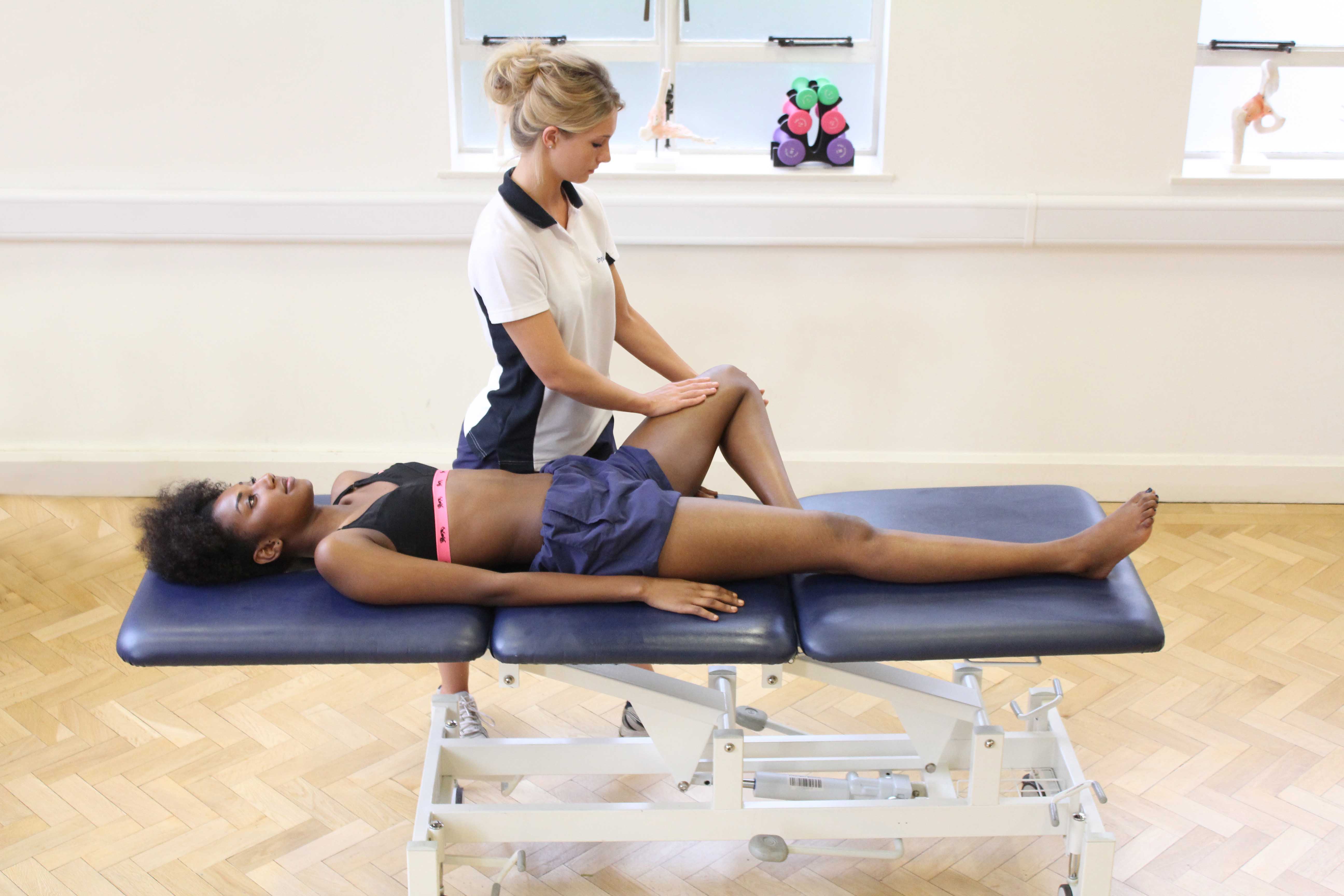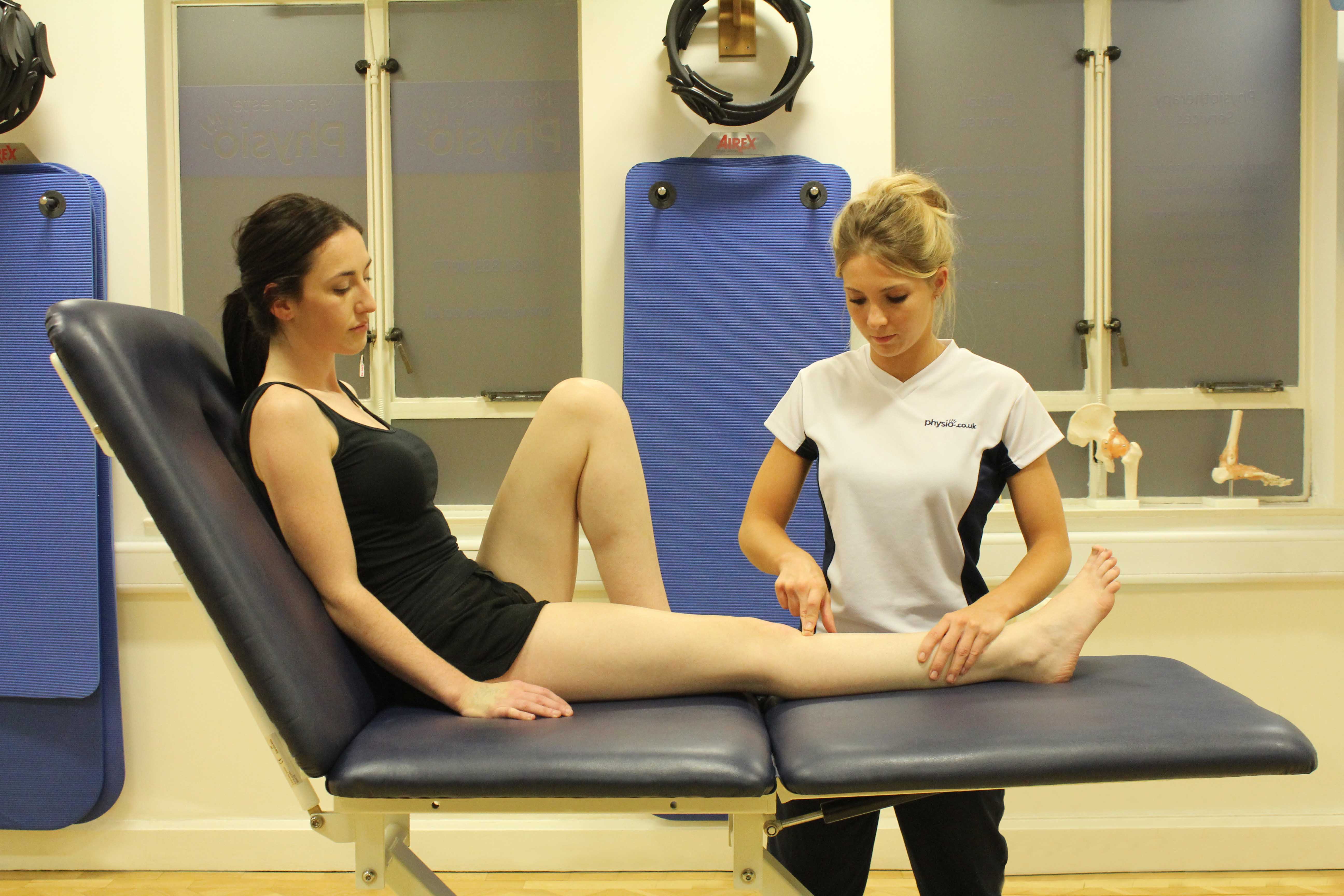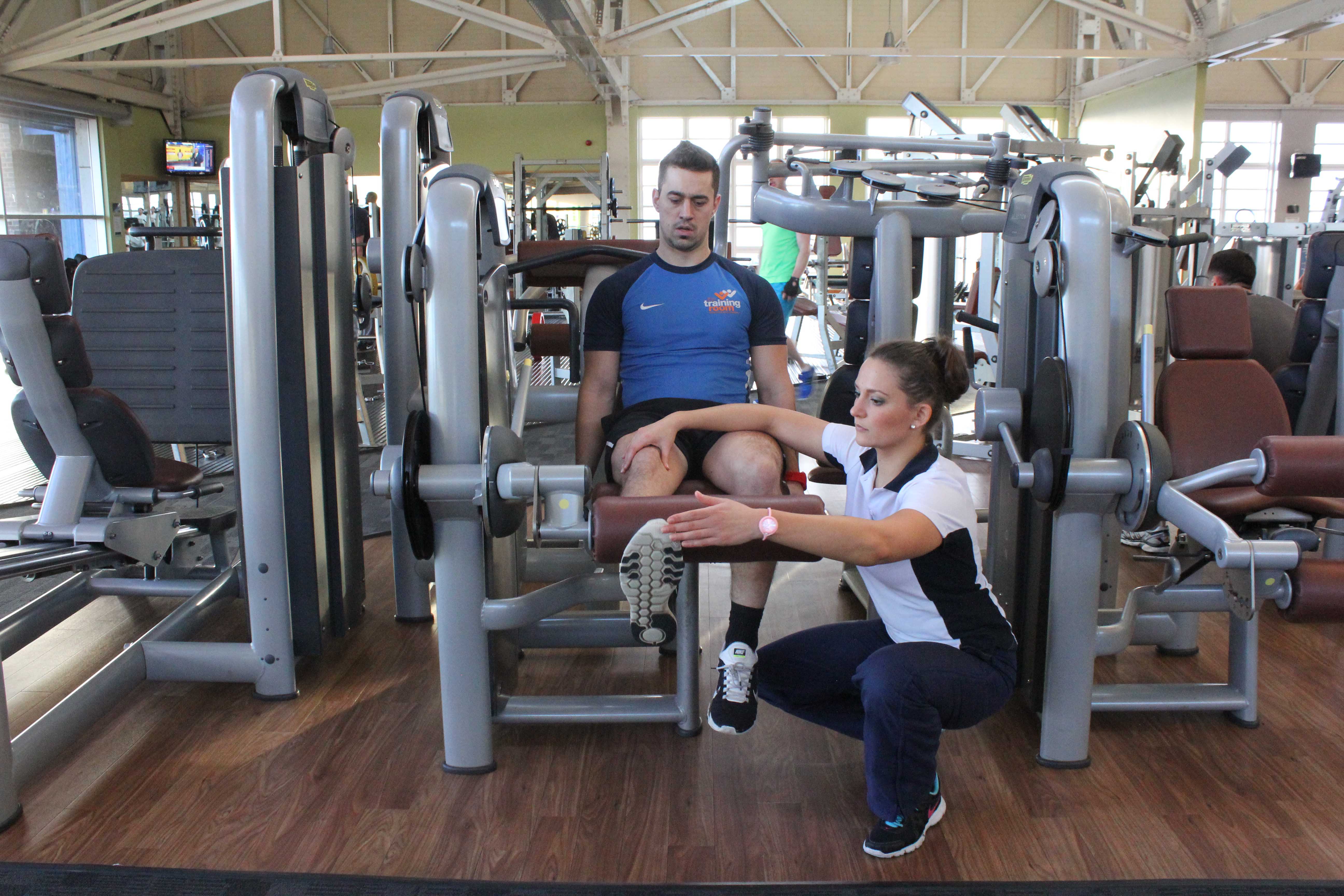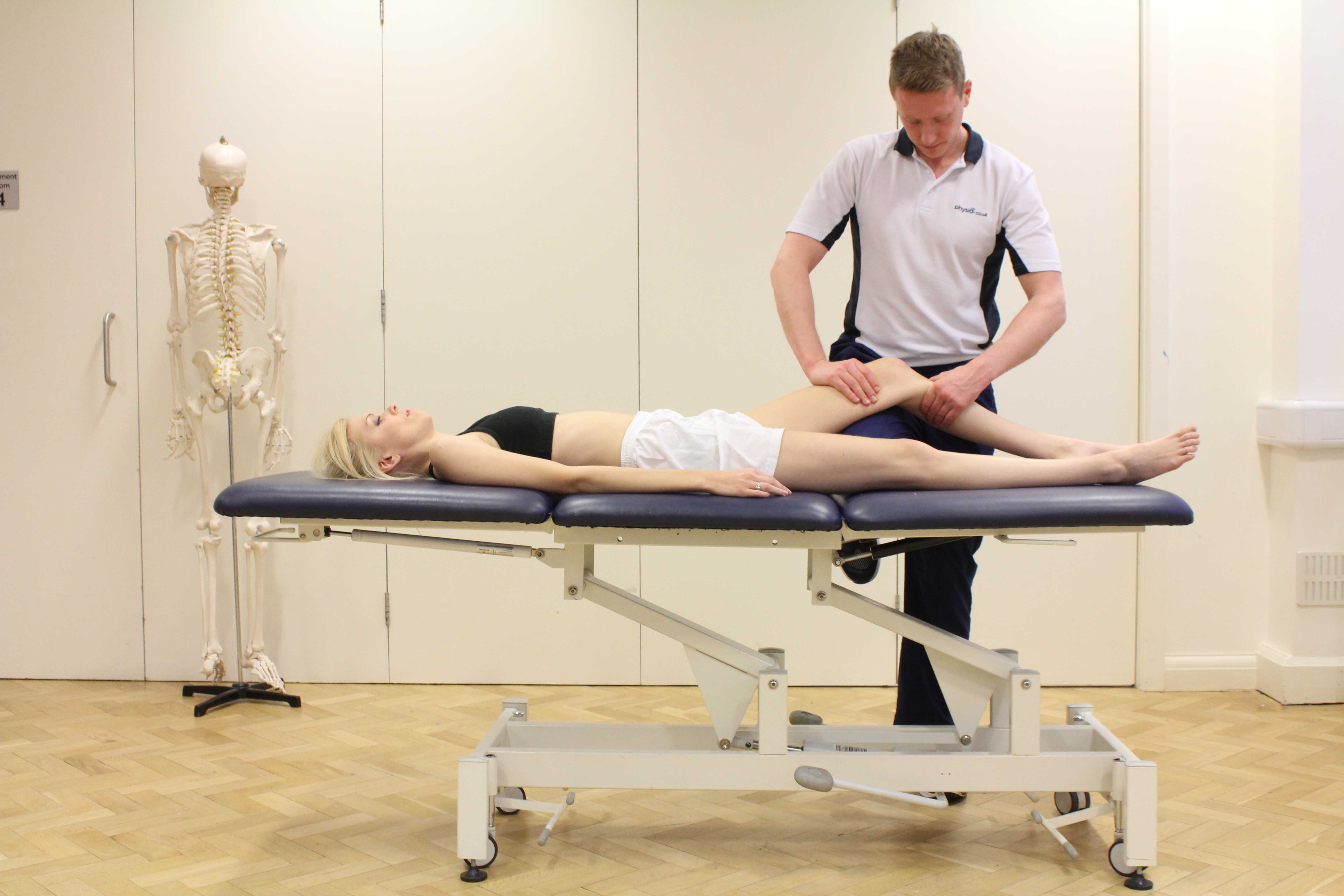MCL surgery
Medial Collateral Ligament (MCL) surgery is the repair or reconstruction of the medial collateral ligament after injury.
The medial collateral ligament is one of four ligaments that are critical to the stability of the knee joint. The MCL is located on the inner side of the knee and is made of thick fibrous material that runs from the thigh bone (femur) to the shin bone (tibia). The MCL can be injured by an outside force (valgus) to the leg that causes the MCL to stretch too far and consequently tear. The severity of the injury is classified in three grades:
- Grade I: Minimal incomplete tear
- Grade II: Incomplete tear with considerable pain and swelling
- Grade III: Complete tear or rupture
 Above: Soft tissue massage of the muscle and connective tissues around the knee
Above: Soft tissue massage of the muscle and connective tissues around the kneeWith an isolated grade I, grade II, and even some grade III MCL tears, surgery is rare. Any damage to the MCL that fits into these categories can be treated conservatively (non-operative) with a specific physiotherapy programme that focuses on stabilising the knee joint. This can be done by regaining strength and full range of movement in the knee.
However, with more severe MCL tears that have caused a considerable amount of instability, the ligament can be repaired or reconstructed surgically. Commonly, surgery to the MCL is recommended if there has been damage to another structure or ligament in the knee that has occurred along with an MCL injury. These injuries may include an anterior cruciate ligament (ACL) injury or a multiple ligament injury (e.g. knee dislocation). The purpose of MCL surgery is that it is to effectively restore the stability and full function in the knee joint after a severe injury.
MCL surgery involves repairing the MCL ligament arthroscopically (key hole) using surrounding tissues or in more severe cases, reconstructing the MCL using other tissues such as a portion of the hamstring tendon or allograft (donor).
 Above: Transverse friction massage of the patella tendon
Above: Transverse friction massage of the patella tendonPhysiotherapy prior to MCL surgery
Physio.co.uk will provide you with an essential rehabilitation programme prior to your MCL surgery to prepare your knee for surgery and aid your recovery afterwards. The goal of pre surgery physiotherapy focuses on reducing any pain and swelling, improving range of movement and strengthening the muscles around your knee. It is also important to strengthen the muscles in your hip, ankle and joints in your uninjured leg to help support your injured knee.
Symptoms after MCL surgery
Immediately after MCL surgery you will experience short term swelling and pain directly around your MCL. For the first few weeks, you will be given elbow crutches and be required to wear a brace to prevent any sudden movements, twisting and stretching of the MCL. You may not be able to drive for up to a week after your surgery. You will also experience limited range of movement in your knee and therefore need to begin a personal physiotherapy programme with Physio.co.uk as soon as possible after your surgery to rapidly regain function in your knee.
 Above: Strength training for the knee, supervised by a MSK Physiotherapist
Above: Strength training for the knee, supervised by a MSK PhysiotherapistPhysiotherapy after MCL surgery
Early stages of rehabilitation
In the initial stages after you have undergone MCL surgery, your physiotherapy programme with Physio.co.uk will focus on decreasing any pain and swelling, improving range of movement, getting you to weight bear as tolerated and begin strengthening weakened muscles around your knee. Your physiotherapy will include:
- Compression, ice and elevation
- Protection (knee brace)
- Early ambulation (walking)
- Gait re-education
- Ice as often as possible before and after activities
- Partial to full weight bearing exercises as tolerated
- Range of movement exercises
- Strengthening of quadriceps and hamstrings
- Stretching of quads, hamstrings and calf muscles
- Strengthening of hip, ankle and muscles in uninjured leg
- Hydrotherapy
 Above: Mobilisations of the knee joint by a MSK therapist
Above: Mobilisations of the knee joint by a MSK therapistLater stages of rehabilitation
Depending on your rate of recovery, your physiotherapy programme with Physio.co.uk will now aim to continue to strengthen the muscles in and around your knee, gain full range of movement, improve proprioception (balance), re educate your gait and introduce sport / activity specific exercises. Also, once your wound from your surgery has healed sufficiently, Physio.co.uk will use electrotherapy such as ultrasound to aid the healing process and strengthen the ligament. Physiotherapy will include:
- Continuation of strengthening exercises for quadriceps and hamstrings and other lower limb muscles
- Progressed range of movement exercises
- Full weight bearing activities
- Stretching of quadriceps, hamstrings and calf muscles
- Proprioception training (balance)
- Gait re-education training
- Agility exercises (changing direction)
- Electrotherapy (ultrasound)
- Static bicycle (resistance as tolerated)
- Hydrotherapy
- Activity / sport specific exercises
Summary
Medial collateral ligament (MCL) surgery is the repair or reconstruction of the MCL after it has been injured. With mild damage to the MCL, surgery may not be required and a conservative approach (non-surgical) involving a personal physiotherapy programme is recommended. In more severe cases, when the MCL has been significantly torn or ruptured, MCL surgery is necessary. After MCL surgery, it is crucial to undergo a comprehensive physiotherapy programme with Physio.co.uk to ensure the success of the surgery and guarantee the return of full function in your knee and get you back to your job, hobbies or sport. Call Physio.co.uk now on 0330 088 7800 for more information or to book an appointment!

 0330 088 7800
0330 088 7800

































